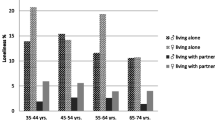Abstract
The assessment of individual vulnerability to stress emerges as a predictive factor of a higher risk of developing stress-related disorders. In the last decade, the geography of immigration in Portugal experienced intense transformations in terms of recruitment and patterns of geographic settlement, with an increasing and exponential inflow of new and diversified migratory groups. The immigrant populations coming from Eastern European countries are a recent migratory flow, with linguistic, cultural and socio-demographic specificities which are very different from the general Portuguese population. This makes them a paradigmatic group in potential transcultural studies on mental health issues. The primary aim of the study was to describe the characteristics of vulnerability to stress and determine their impact on the mental health status of Russian-speaking immigrants residing in Portugal. The relationship between vulnerability to stress, sociodemographic variables, mental health status and social support were analyzed, using the SSQ6, GHQ28, 23QVS and a socio-demographic questionnaire. A comparative analysis was carried out, using a control group of 110 Portuguese subjects without previous migratory experiences, matched by sex, age group and academic qualifications. The eastern European immigrants reported high levels of vulnerability to stress assessed by the cut-off point of the 23QVS. Immigrants also reported higher percentage of vulnerability to stress and lower social support levels of social support versus the control group. Several factors inherent to the dynamics of the migratory process were related to the presence of vulnerability to stress. The findings suggest that vulnerability to stress is positively correlated with worse mental health outcomes and negatively correlated with the social support perceived as available—number of supporters and satisfaction with social support.
Similar content being viewed by others
References
United Nations. International Migration Report 2002. Department of Economic and Social Affairs Population Division. Geneva, UN; 2002.
Almeida C, Funk M, Muijen M. Portugal WHO country Summary. WHO, Geneve 2009. Available on http://www.acs.min-saude.pt/files/2010/03/Portugal-CountrySummary_FINAL_para_WEB.pdf.
Bhugra D. Migration and mental health (2004). Acta Psychiatr Scand. 2004;109:243–58.
Kuo WH. Theories of Migration and Mental Health: an Empirical Testingon Chinese Americans. Soc Sci Med 1976;10:297–6.
Lundstedt S. An introduction to some evolving problems in cross-cultural research. J Soc Issues. 1963;19(3):1–9.
Palinkas LA. Ethnicity, identity and mental health: the use of rhetoric in an immigrant Chinese church. J Psychoanal Anthropol. 1982;5(3):235–58.
Berry JW. Immigration, acculturation, and adaptation. Appl Psychol. 1997;46:5–68.
Berry JW. Acculturation as varieties of adaptation. In Padilla AM editor. Acculturation: theory, models and some new findings. Boulder: Westview Press; 1980.
Portes A, Rumbaut RG. Immigrant America: a Portrait. Berkeley: University of California Press; 2006.
Valdes TM, Baxter JC. The social readjustement rating questionnaire: a study of Cuban exiles. J Psychosom Res. 1976;20(3):231–6.
Garza-Guerrero AC. Culture shock: its mourning and the vicissitudes of identity. J. Amer Psychoanal Assn. 1974;22:408–9.
Bhugra D, Becker M. Migration, cultural bereavement and cultural identity. World Psychiatry. 2005;4(1):18–24.
Vaz-Serra AS. O stress na vida de todos os dias. Edição de Autor. Coimbra; 1999.
Wheaton B. Sampling the stress universe. In: Avison WR, Gottlieb GH, Edit. Stress and mental health: contemporary issues and prospects for the future. Plenum Press: NY; 1994. p. 77–114.
Sarason IG, Sarason BR, Shearin EN, Pierce GR. A brief measure of social support: practical and theoretical implications. J Soc and Pers Relat. 1987;4:497–510.
Monteiro AP. Adaptação e análise psicométrica da versão russa da Escala de Suporte Social, SSQ6 de Sarason et al. (1987), adaptada a partir da versão de Pinheiro e Ferreira (2002), a populações imigrantes da Europa de Leste a residir em Portugal. Actas de XI Conferência Internacional, Avaliação Psicológica: Formas E Contextos, Universidade do Minho; 2006.
Vaz Serra A. Construção de uma escala para avaliar a vulnerabilidade ao stress. Psiquiatria Clínica. 2000;21(4):279–308.
Goldberg DP¸ Hillier VF. A scaled version of the General Health Questionnaire Psychol Med. 1979;9:139–5.
The Jong K, Van Der Kam S, Ford N, Hargreaves S, Van Oosten R, Cunningham D, Boots G. The trauma of ongoing war in Chechnya: quantitative assessment of living conditions, and psychosocial and general health status among war displaced in Chechnya and Ingushetia. MSF 2004. Available in http://www.uk2.msf.org/reports/chechnya.htm.
Goldberg D, Williams P. A user’s guide to the General Health Questionnaire. Windsor: NferNelson, Publishing Company Ltd.; 2006.
Rosa MJV. (Des) encontro entre as Migrações Internacionais (laborais) e Qualificações (escolares)—o caso dos europeus de leste a residir em Portugal. SociNova Migration, Universidade Nova de Lisboa; 2005.
Turner RJ. Direct, Indirect, and Moderating Effects of Social Support onPsychological Distress and Associated Conditions. In: Kaplan HB, editor. Psychosocial stress. Trends in theory and research. New York: Academic Press; 1983.
Schwarzer R, Leppin A. Social support and health: a theoretical and empirical overview. J Soc Pers Rel. 1991;8(1):99–127.
Schlossberg N, Waters EB, Goodman, J. Counseling adults in transition: linking practice with theory 2 editor. Berlin: Springer; 1995.
Lu L. Social support, reciprocity, and well-being. J Soc Psychol, 1997,137(5):618–28.
Ritsner M, Modai I, Ponizovsky A. The Stress-support patterns and psychological distress of immigrants. Stress and Health. 2000;16(3):139–47.
Sluzki CE. Migration and family conflict. In Moos RH editor. Coping with life crises. New York: Plenum; 1986. p. 277–288.
Ritsner M, Ponizovsky A. Psychological distress through immigration: the two phase temporal pattern? Int J Soc Psychiatry. 1999;45(2):125–39.
Author information
Authors and Affiliations
Corresponding author
Rights and permissions
About this article
Cite this article
de Almeida Vieira Monteiro, A.P.T., Serra, A.V. Vulnerability to Stress in Migratory Contexts: A Study with Eastern European Immigrants Residing in Portugal. J Immigrant Minority Health 13, 690–696 (2011). https://doi.org/10.1007/s10903-011-9451-z
Published:
Issue Date:
DOI: https://doi.org/10.1007/s10903-011-9451-z




